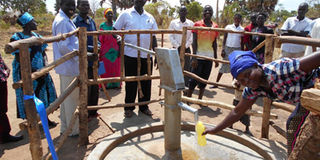Residents fund construction of community water sources

Amach Sub-county chairperson Bernard Adoko (centre) hands over one of the boreholes to residents on February 22. PHOTO BY BILL OKETCH
What you need to know:
Methodology. The money was collected by village chairpersons and taken to the sub-county.
Lira. At least 14 new water sources have been constructed in Amach Sub-county, Lira District, with financial support from both the community and a humanitarian agency.
This newspaper has learnt that members of each village contributed Shs100,000 towards the construction of each borehole in the area. The money was collected by village chairpersons and taken to the sub-county, Mr Sam Obala, the chairperson of Ekude Village in Alworo Parish, told Daily Monitor last week.
Altogether, the community contributed Shs1.4 million towards the water project whose implementation commenced in January and ended in December 2018.
Ryans Well Foundation, a Canada-based non-profit water charity, through its partner organisation, Divine Waters Uganda, contributed Shs210 million to the project.
The investment has brought access to clean water, improved sanitation and hygiene education for 3,804 people in the area.
It has also raised water coverage in the sub-county from 74.2 per cent in 2017 to 80.6 per cent in 2018. Sanitation coverage has risen to 46.8 per cent up from 41.2 per cent, according to Divine Waters Uganda Annual Report 2018.
In its 2009 report, the International Institute for Environment and Development (IIED) criticised donors, governments and non-governmental organisations (NGOs) for installing boreholes and wells in rural Africa without ensuring their long-term sustainability.
The report said up to $360m had been spent on building boreholes and wells that then became useless because they were not maintained or fixed when they broke down.
In Amach, Ms Harriet Aboko, the sub-county chief, said water and sanitation committees have been set up to monitor the new boreholes and always contact newly trained mechanics if one breaks down.
The committees meet regularly with village health teams, she added.
“The idea is that everyone who uses the boreholes will contribute financially to their long-term maintenance,” the assistant district water officer, Mr Jimmy Otim, explained.
A total of 168 residents have been trained to take responsibility for operating, maintaining and sustaining the new water sources.




